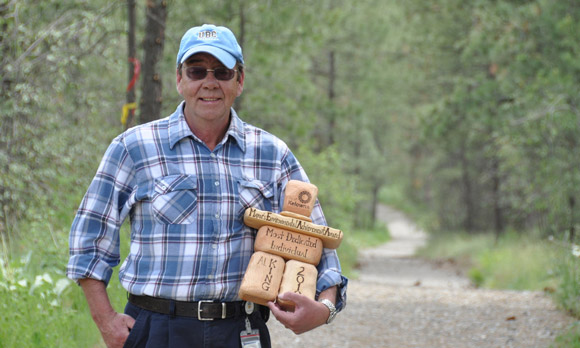
Allan King, manager of maintenance and grounds, with the City of Kelowna's Most Environmentally Dedicated Individual award he won last week. Behind him is the campus trail system, one of the many campus sustainability initiatives King has championed over the years. The Okanagan campus itself won the Most Sustainable Development award.
There’s no question that UBC’s Okanagan campus is leading the way when it comes to sustainability stewardship. That leadership has been recognized with two prestigious City of Kelowna 2010 Mayor’s Environmental Achievement Awards.
Each year, the City presents awards in seven categories to individuals and groups who demonstrate an outstanding commitment to environmental stewardship in the City of Kelowna.
The campus was noted for making strides toward sustainability and demonstrating outstanding and innovative contributions to environmental sustainability, receiving first place in the Most Sustainable Development Award category.
Dedicated individuals from the campus community are at the heart of advancing the campus’ sustainability mandate.
In addition to the Most Sustainable Development award for the campus, UBC’s “Compost King” Allan King, received recognition. King, who has been involved with the Kelowna campus for 30 years, received the first-place award in the Most Environmentally Dedicated Individual category.
See the City of Kelowna media release about the awards
http://www.kelowna.ca/iNews/scripts/nws002.cfm?News_ID=2121
At a Glance
Okanagan campus sustainability features include:
- Artificial turf sports field requires no water for irrigation
- U-Pass public transit passes subsidized for all students, with transit ridership volumes after the introduction of the U-Pass increasing by 48% from 2006-2007
- The Learning Garden, fostering social and cultural sustainability
- A Stormwater Management Plan including a retention pond for collecting and draining runoff into the earth, diverting it from city sewers
- Recycling program which includes recycling paper, refundable bottles and cans, e-waste, Styrofoam, batteries, lab plastics, garden waste, e-waste, and as of Spring 2010 it now includes organic waste composting
- Hunter Wireless landscape irrigation controller connected to the on-campus weather station, minimizing unnecessary watering
- Locally sourced food including 50 per cent vegetables and 60 per cent fruit
- Benches and waste reciprocals have a high content of recycled material; for example, one bench may contain 728 pop cans
- Preferred parking for carpoolers
- More than 8 km. of walking and biking trails
- Four student Collegia — an on-campus home away from home for commuting students — fostering social and cultural sustainability
- Every year 250 trees are planted on campus
- 75 courses either directly or indirectly relate to sustainability
- Campus tours demonstrate the campus as a living laboratory and highlight sustainable features
- Campus-organized events include Bike to Work Week and World Water Week
- Facilitating community focused events including the City of Kelowna Mayor’s Youth Forum and launch of the goBEYOND program, a youth-led climate change awareness, education and action program which engaged over 200 students in seven months
To find out more visit the Okanagan campus Sustainability Office website
http://www.ubc.ca/okanagan/sustainability
— 30 —